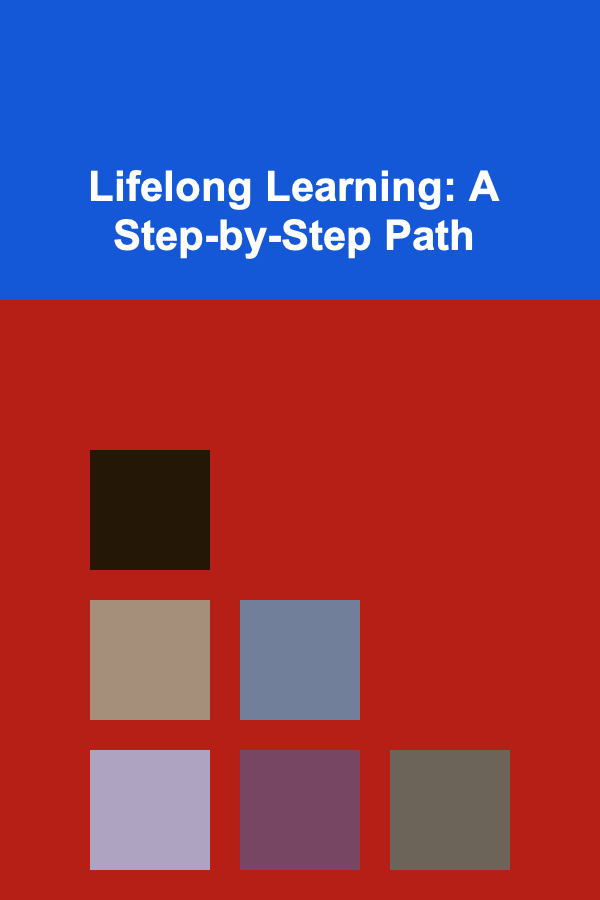
Lifelong Learning: A Step-by-Step Path
ebook include PDF & Audio bundle (Micro Guide)
$12.99$8.99
Limited Time Offer! Order within the next:

Lifelong learning is a concept that transcends the boundaries of formal education. It's a journey that extends beyond the classroom, into every aspect of our lives. The process of continuous self-improvement through learning is essential for personal development, career growth, and staying relevant in a rapidly changing world. In an era of technological advancements and constant evolution, the ability to learn and adapt has never been more crucial. Lifelong learning empowers individuals to become adaptable, engaged, and capable of navigating both personal and professional challenges.
In this article, we will explore the concept of lifelong learning, its significance, and provide a step-by-step guide on how to develop a mindset of continuous learning throughout one's life.
Understanding Lifelong Learning
Lifelong learning refers to the ongoing, voluntary, and self-motivated pursuit of knowledge for personal or professional development. Unlike traditional education, which often ends after formal schooling, lifelong learning is an approach that encourages individuals to continuously seek new knowledge and skills across various stages of life. It encompasses a wide range of activities, from formal courses and degrees to informal learning experiences such as reading, traveling, or engaging in hobbies.
The core idea behind lifelong learning is that learning should never stop. It is a mindset, a commitment to self-improvement, and a willingness to embrace new ideas and challenges. Lifelong learners are curious individuals who constantly seek ways to improve their understanding of the world, their abilities, and their perspectives.
The Importance of Lifelong Learning
Lifelong learning is increasingly important in today's rapidly changing world. With the rise of new technologies, the global economy, and shifting job markets, the need for continuous learning is more pressing than ever. Here are a few reasons why lifelong learning is vital:
- Adapting to Change: The pace of technological change is accelerating. Industries, professions, and job roles evolve constantly, and those who do not continue to learn may find themselves left behind. Lifelong learning enables individuals to stay current and adapt to these changes.
- Career Growth and Development: In many fields, continuous learning is key to career advancement. Acquiring new skills, certifications, and knowledge enhances professional capabilities and opens doors to new opportunities.
- Personal Fulfillment: Beyond career benefits, lifelong learning also contributes to personal growth and satisfaction. Learning new things can provide a sense of achievement, build confidence, and ignite curiosity, leading to a more fulfilling life.
- Improved Problem-Solving Skills: Lifelong learners often develop strong problem-solving abilities because they are constantly exposed to new information and experiences. The ability to think critically, creatively, and flexibly is essential in today's complex world.
- Health and Cognitive Function: Engaging in lifelong learning can also have physical and cognitive benefits. Studies have shown that continued intellectual engagement can help maintain brain health, prevent cognitive decline, and even improve overall well-being.
The Path to Lifelong Learning: A Step-by-Step Guide
While the concept of lifelong learning is important, how does one embark on this journey? The following steps provide a practical roadmap for incorporating continuous learning into daily life.
Step 1: Cultivate Curiosity
The foundation of lifelong learning is curiosity. Lifelong learners are naturally curious individuals who seek to understand the world around them. This curiosity drives them to ask questions, explore new topics, and seek out new experiences. To begin your lifelong learning journey, start by embracing curiosity in all areas of life.
- Be Open to New Ideas: Engage with different perspectives and viewpoints. Read books, watch documentaries, or attend talks on subjects outside of your immediate field of interest.
- Ask Questions: Don't settle for surface-level knowledge. Ask questions and seek deeper understanding. Develop a mindset that challenges assumptions and encourages exploration.
- Stay Curious About Everyday Life: Lifelong learning isn't confined to formal education. Everyday life is full of learning opportunities. Whether you're cooking, traveling, or solving a problem at work, approach every situation as a chance to learn.
Step 2: Set Clear Learning Goals
Setting clear learning goals helps you stay focused and motivated. Lifelong learning can be overwhelming if you don't have a direction, so it's important to define specific objectives and break them down into manageable tasks. These goals can be related to your career, personal interests, or self-improvement.
- Identify What You Want to Learn: Reflect on your interests, needs, and aspirations. What skills would enhance your life or career? What areas would you like to explore further? Once you have identified your learning goals, write them down.
- Make Your Goals SMART: Ensure your goals are Specific, Measurable, Achievable, Relevant, and Time-bound. For example, instead of saying, "I want to learn a new language," make it specific: "I want to learn conversational Spanish within six months."
- Track Your Progress: Regularly review your goals and progress. Adjust them if necessary and celebrate small wins along the way to stay motivated.
Step 3: Embrace Different Learning Methods
Lifelong learning is not limited to traditional classroom settings. In fact, the modern world offers a wide array of learning methods, from online courses to self-directed reading to hands-on experiences. It's important to explore different ways of learning to find what works best for you.
- Formal Education: Enroll in courses, attend workshops, or pursue higher education if it aligns with your goals. There are many online platforms (e.g., Coursera, Udemy, edX) that offer courses on a wide range of topics, often with flexible schedules.
- Self-Directed Learning: Read books, listen to podcasts, watch instructional videos, or explore free online resources. Self-directed learning allows you to learn at your own pace and on your own terms.
- Practical Experience: Learning through experience is often the most powerful way to gain knowledge. Engage in projects, internships, volunteer work, or hobbies that allow you to apply what you've learned in real-life situations.
- Social Learning: Interacting with others can enhance your learning experience. Join study groups, attend networking events, or participate in online communities where you can share knowledge and gain insights from others.
Step 4: Create a Learning Schedule
Like any habit, lifelong learning requires consistency. It's important to dedicate time for learning, even if it's just a small portion of your day. Creating a learning schedule helps ensure that you're consistently making progress toward your goals.
- Set Aside Time Each Day: Even if it's only 15--30 minutes a day, commit to dedicating time to learning. Whether it's reading a chapter of a book, watching a tutorial, or practicing a new skill, consistency is key.
- Incorporate Learning into Your Routine: Integrate learning into your daily routine. Listen to educational podcasts while commuting, watch instructional videos during breaks, or dedicate an hour in the evening to studying.
- Stay Flexible: Life is unpredictable, so be flexible with your learning schedule. If you miss a day, don't get discouraged. Simply adjust and continue forward.
Step 5: Reflect and Adapt
Reflection is a crucial part of the lifelong learning process. Regularly reflect on what you've learned, how it has impacted your life, and what adjustments you may need to make to improve your learning experience.
- Reflect on Your Progress: Periodically assess your progress toward your learning goals. What knowledge or skills have you gained? What challenges have you faced? Use this reflection to identify areas for improvement.
- Adapt Your Approach: If you find that a particular learning method isn't working for you, don't be afraid to try something new. Lifelong learning is about experimenting and adapting to find what works best for your unique needs.
- Celebrate Your Achievements: Acknowledge and celebrate your successes along the way. Whether it's mastering a new skill, finishing a course, or simply gaining new insights, take pride in your progress.
Step 6: Stay Motivated
Motivation is often the hardest part of the lifelong learning journey. It's easy to get distracted or discouraged, especially when life becomes busy. To stay motivated, find ways to keep learning exciting and meaningful.
- Find a Learning Community: Surround yourself with like-minded individuals who share your learning goals. A supportive learning community can keep you accountable, provide encouragement, and foster a sense of camaraderie.
- Make Learning Enjoyable: Choose topics and activities that genuinely interest you. Learning doesn't have to feel like a chore. By focusing on subjects that you're passionate about, you'll naturally stay motivated.
- Embrace the Journey: Lifelong learning is a process, not a destination. Enjoy the journey of discovery and self-improvement, and focus on the satisfaction that comes with gaining new knowledge and skills.
Step 7: Apply What You Learn
The true value of lifelong learning comes from applying the knowledge and skills you've acquired in real-world situations. Whether it's in your career, personal life, or community, put what you've learned into practice to solidify your understanding and create tangible results.
- Experiment and Innovate: Use your new skills to experiment with new ideas, projects, or goals. Innovation often stems from the application of newly acquired knowledge.
- Teach Others: One of the best ways to reinforce what you've learned is by teaching others. Share your knowledge with friends, family, or colleagues. Teaching is a powerful way to deepen your understanding and contribute to the learning of others.
Conclusion
Lifelong learning is an ongoing, fulfilling process that enriches both your personal and professional life. By cultivating curiosity, setting clear goals, embracing different learning methods, and applying your knowledge, you can develop a lifelong learning mindset that helps you grow continuously. In today's fast-paced world, learning is not just about acquiring knowledge---it's about adapting, evolving, and thriving in a world that's always changing. So, take the first step, stay committed to learning, and enjoy the endless possibilities that come with it.

How to Plan a DIY Family Spa Night with Homemade Products
Read More
How To Describe People and Places Accurately
Read More
How to Wrap Odd-Shaped Gifts Like a Pro (Using Wrapping Paper)
Read More
How to Track Childcare Expenses for Blended Families
Read More
How to Build a Victorian Dollhouse from Scratch
Read More
How to Build a Fish Care Checklist for Beginners
Read MoreOther Products

How to Plan a DIY Family Spa Night with Homemade Products
Read More
How To Describe People and Places Accurately
Read More
How to Wrap Odd-Shaped Gifts Like a Pro (Using Wrapping Paper)
Read More
How to Track Childcare Expenses for Blended Families
Read More
How to Build a Victorian Dollhouse from Scratch
Read More